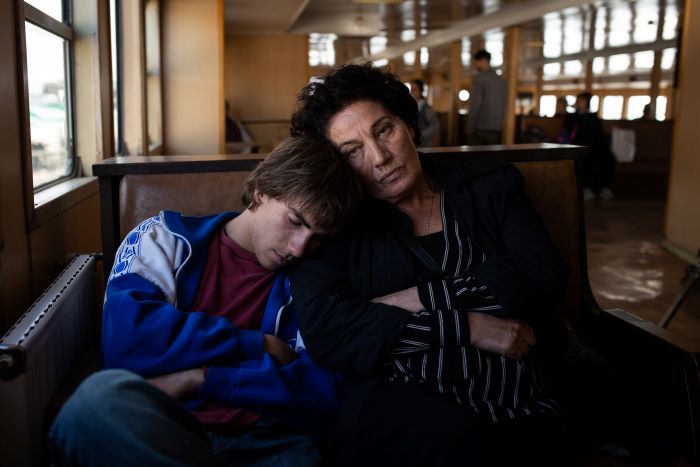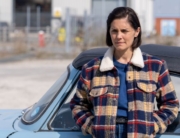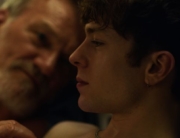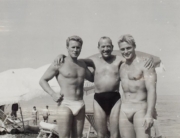My first encounter with director Levan Akin and his work was with 2019’s And Then We Danced. While not his debut, it certainly gave him international recognition. And, because of its portrayal of gay romance, backlash from the Georgian government. That didn’t stop Akin from working on his next movie in a similarly controversial vein, taking its inspiration from a real-life story of a Georgian grandfather who supported his trans granddaughter. That movie would become Crossing.
Crossing opens upon a chaotic, bickering household: Achi (Lucas Kankava), his older brother, his wife, and their baby boy. The loud arguing is cut short by the mysterious arrival of the older brother’s former high school teacher, Lia (Mzia Arabuli). She has come searching for her trans niece, Tekla, who used to live nearby, but no one in the households knows what happened to her or the other trans women after they were forced out of their home. After Lia leaves having no further information, Achi runs after her, giving her Tekla’s forward address in Istanbul. He says he used to hang out and smoke with Tekla. Soon, the unlikely duo of the matter-of-fact, blunt Lia and the impulsive, young adult Achi set off on a journey to Turkey, without a map or knowing Turkish. Tekla serves as a myth-like center for the movie as Lia and Achi embark on their search.
As the movie transitions to Istanbul, the energy shifts into one of the film’s strong suits: Its naturalist portrayal of Istanbul’s beauty and chaos. Akin also masterfully paints a panorama of Istanbul’s underground nightlife. In other words, the Istanbul of the “others,” the ones who rarely have representation in Turkish cinema due to prejudice and discrimination, such as the trans rights activist and lawyer Evrim (Deniz Dumanli). She has a unique position in the storyline—she breaks Lia’s preconceptions of trans people. In a repressive media environment, Evrim stands out as an “individual” rather than a stereotype or a comical element.
While Evrim is groundbreaking in terms of representation, the manner of her life’s “crossing” with Lia and Achi’s feels rather forced and conventional. As a result of that and in the introduction of some underdeveloped characters, the movie loses some of its spell as it begins to revolve around the question “What next will happen?” The focus shifting to Evrim’s perspective distracts from Lia and Achi’s journey in a way that isn’t well integrated into the broader film as a whole.
Despite them being from different generations, the dynamic between Lia and Achi becomes believable, humorous, and touching. Both have yet to discover the purpose of their lives. Mzia Arabuli and Lucas Kankava’s performances complete each other in juxtaposition. A former Sergei Parajanov collaborator, Arabuli enchants as Lia, who has been hardened by the social norms that led to her niece’s alienation and eventual running away. She, in a way, represents the women of her generation who were taught not to show emotion and live by certain rules, despite what their hearts and souls might say. The carefully developed portrayals of these characters carries the movie in spite of its failure to connect its multiple subplots in less predictable ways.
Crossing is an essential movie for its representation of the LGBT+ community in Georgia and Turkey, despite some of its structural issues. Especially in a political climate such as in Turkey and Georgia, Crossing bravely stands against repression.







Leave A Comment